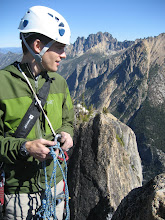I've officially gotten off of the crutches. For the past seven weeks, I have been slowly clack-clack-clacking around Seattle, not to mention on a trip to Banff as well as to visit my family in Oklahoma. I've traded up for the 'clunk clunk clunk' of a walking boot. Still not perfect, but much faster and less obnoxious than the crutches. The best part is that my hands are now free to do things such as carry a glass of water from the kitchen to the table, or go grocery shopping without bringing my mountaineering pack to load groceries into.
There were some highlights to being on crutches. They forced me to rely on the bus for my transportation needs during the day. Riding the bus during the day, and sitting up front in the seats for the infirm (e.g. me) provided constant, well, interesting interactions with other bus patrons. Most of these interactions involved people who were under the influence. The influence of drugs, alcohol, or mental illness, that is. First of all, they want to know what happened to me. When I give them my 'elevator' story (15 sec spiel), the first thing I usually get is tons of empathy, and supportive words. It's amazing - people on their way to the methadone clinic are usually say something like "You're not gonna quit climbin', are you, man? You can't quit!" I appreciate their dedicated spirit, even if I wish they didn't take the same approach to their, umm, hobbies. There's a surprising genuineness to these brief interactions. Someone with a lot of challenges, who may even be at the margins of society, knows a thing or two about hard times. I appreciate their kind words; I think they're from the heart.
Being on crutches means being slow. Which meant that for the first couple of weeks I was pissed off and late a lot. Slowly I embraced the slowness. Leaving my apartment a minute or two earlier than I otherwise would since it takes longer to walk to the bus stop. Settling on accomplishing fewer errands in a day. Yes, people on crutches run errands (think groceries and doctor follow-ups). Embracing the slowness led me to be more observant in my day to day routines. Again, the bus provides interesting sources of conversation and inspiration. One day, after hanging out at the beach (what else am I supposed to do? I'm unemployed!), I got on the bus, and had to wait a few minutes before it began its route. I was sitting silently reading, and the bus drive blurts out to me "What's a pachyderm?". No, I'm not having a weird dream. She asked me this. Before I could answer, she says "It's a camel, right?". I'm flummoxed. I can't see her clearly, and I am struggling for context. The best I could come up with in the moment was "I think a camel is a dromedary; a pachyderm is an elephant. Why do you ask?". She runs over the end of my sentence "So what's a kid lit pachyderm?". It starts to come together in my brain - she's working a crossword. I say "Maybe it's Babar", which I pronounce baaah-bar. She replies "Bay-bar? That kids book? Oh, right! Kid lit, like literature!". We went through a few more clues, and I proved to be of some use. "OK, fun's over, we gotta go to work now", and she starts driving the bus.
I ask which crossword she's doing. It's the New York Times, and it's a Tuesday, which explains the do-able clues. I tell her that I feel like a big man if I can finish all of Wednesday, and I'm hopeless on Thursday and Friday (they increase in difficulty through the week). She tells me she doesn't like it ever since Will Shortz became the editor. She then tells me about growing up, her mother worked the crosswords, and back in those days they required one to be well versed in literature and the bible; "all these foo foo clues were in the TV guide crossword, not the real one like they are today!" she complained. She says that she came from a family of 6 kids, and they would come together on Sunday nights and work the puzzle together.
We discussed our mutual love of crosswords, and then it was my stop. The story she told me sounded like something from a Studs Terkel interview. I felt lucky to have had this moment. It was unlikely, and stereotype shattering. The woman had a coarse way of talking, abrasive almost. She drove a bus, ostensibly not an intellectual vocation, but yet, in her own words, "schooled most of those Thursday puzzles, but started to get challenged on Fridays." I challenge you to find someone who can come close to schooling the Thursday NYT puzzle!
Living a slowed down life has led to quite a few interactions with people where our exchange was more human, more individual. Even if I can smell the vodka all the way across the aisle and it's 8:30am. Rather than being frustrated, I've managed to go with the flow and appreciate the slower moments in life. As I get back on my feet, I hope I can become as productive as I'm used to being without losing that perspective on savoring the slower moments, interactions, and sensations.
Monday, July 13, 2009
Subscribe to:
Post Comments (Atom)

I have recently started doing the NYT crossword puzzle on my iPhone. I, too, have noticed that Thursday and Friday are barely doable. Saturday and Sunday I am lucky to get through half.
ReplyDelete